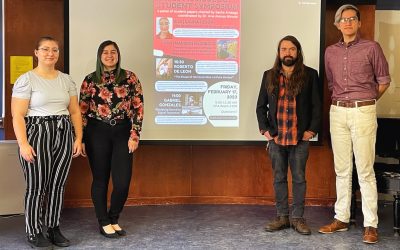Dr. Kristina Jacobsen wins award for an article
The article ‘Don’t Even Talk to Me if You’re Kinya’áanii [Towering House]’: Adopted Clans, Kinship, and ‘Blood’ in Navajo Country” was awarded “the most thought-provoking article in Native American and Indigenous Studies of 2019” by the Native American and Indigenous Studies Association.
“Kristina Jacobsen’s and Shirley Ann Bowman’s article offers an insightful view on the dynamic formation of the Diné/Navajo kinship system (k’é) through the practices of adopting and incorporating in clan formation in the late-nineteenth and early-twentieth centuries, with some glances at the omnipresence of this history in present times. Moreover, this study throws light on how adoption became the terrain for multiform racial, cultural, and geographical crossings in Navajo Nation-building and permanence; as well as on the extent settler-colonial policies on citizenship and “ancestry” historically disrupted this extraordinarily dynamic clan formation process. As a publication authored by a non-Indigenous and a Diné scholar, this article is a sample of collaborative practice and reciprocity, materialized in a well-grounded ethnographic, archival, linguistic, and cultural research. In our view, this study suggests important ways to historically reflect on questions of tribal enrollment, citizenship, identity, belonging, incorporation, and movement of peoples in American Indian life.” ~NAISA Prize Committee, 2019
Musicology students present their research at UNM 2023 Musicology Student Symposium
Musicology students present their research at UNM 2023 Musicology Student Symposium How can music be used to revitalize a language? How can opera be a journey of healing from trauma? How does a popular music genre interact with the Mexican drug war? How can hyperpop...
UNM Ethnomusicology and Anthropology professor, Kristina Jacobsen, reflects on her recent trip to South Africa with the Diné-led jazz trio, DDAT
How a Song Bridged Diné and Ndebele Worlds An anthropologist recounts a magical moment of songwriting collaboration between Diné (Navajo) and Ndebele artists gathered for the WOMAD Festival in South Africa. By Kristina Jacobsen Originally published November 30, 2022,...
Visiting Scholar Dr. Javier Marín-López to present on Colonial and Baroque Music in the Americas
Visiting Scholar Dr. Javier Marín-López to present on Colonial and Baroque Music in the Americas Visiting Scholar Dr. Javier Marín-López, Professor of Musicology at the University of Jaén, Spain, will present two lectures at UNM this month. He is a scholar specialized...



